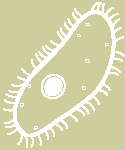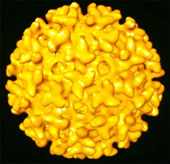|
Rick Anthony
–
virologist
|

|
"
The key to understanding how biology works is to discover why it "behaves" the way it does."
|
 |
| |
|
|
|
| |
How were you motivated to choose your particular field? |
| |
A curiosity for understanding how
life works drove me to pursue my career as a microbiologist. I had
always been interested in nature and medicine in college, but my
life somehow led me into a job in concrete construction. One day,
while working on the foundation of an office building in the hot
Texas sun, my thoughts kept returning to a magazine article I had
read about how scientists believed viruses cause disease. At the
end of that day I realized I wanted to know more about viruses than
that article could supply. So I quit my job that afternoon and went
directly to the University of Texas, still wearing my dirty work
clothes, and enrolled in a graduate program in Microbiology. Since
that day I have never stopped seeking to understand. |
|

|
| |
|
|
|
| |
What can you share about your creative process? |
| |

|
|
The key to understanding how biology works is to discover why it"behaves" the way it does. Whether it is the migration of geese, the bloom of a rose, the spread of a cancer, the replication of a virus or the chemical reaction of an enzyme, all biological processes are responding to things in their environment. Understanding the elements that contribute to this behavior allows you to "think" like a Goose, a rose, a cancer, a virus, or an enzyme. Once you achieve this understanding you can explore the endless possibilities it creates.
|
|
| |
|
|
|
| |
What ideas do you have for a future human community on Mars?
|
| |
From a technological standpoint there are very few hurdles left in the way of creating an inhabitable structure on another planet. Engineered solutions to conquering hostile environments are only limited by the amount of minds, machines and resources mankind is willing to apply. If unlimited technological resources were available, we would be surprised to learn that the main barrier to Mars colonization is biological.
The capability to produce food on a continuing basis will be the single most limiting component of life support for the Mars Colony. Shipping food from Earth for a small colony, even for a limited duration visit, would be too expensive and impractical. Only a controlled agriculture ecosystem with crop production utilizing recycled solid, liquid, and gaseous wastes under conditions of mass closure will eliminate the need for re-supply of food, oxygen, and water for the isolated Mars colony. Since animal farming creates additional complex problems for maintaining a balanced ecosystem, the colonist's diet has to be purely vegetarian. Additional protein would be supplemented by growing micro-organisms like algae and brewers' yeast which are currently used to make nutritional supplements on Earth.
To create a sustainable ecosystem the entire colony would have to be designed as a self–organizing, energetically open, materially closed, system capable of long term self–renewal. The maintenance of a biological equilibrium state would be critical to such a system, since the smaller the ecosystem the more susceptible it is to instability and failure, which in this case would lead to colony extinction. Undoubtedly such an ecosystem would be monitored and maintained by automated, computerized systems. However, the sensitivity of the ecosystem to biological imbalances would be beyond the capability of technology to sustain, and be primarily dependent on careful nurturing by the colonists.
In designing this ecosystem, careful selection is essential for every organism which will have far reaching affects on colony survival, whether it be man himself, or the bacteria and viruses he harbors. For instance, proper selection of crops for nutritional content is important to avoid dietary insufficiencies that would threaten the survival of colonists in much the same way vitamin–C deficiency (Beriberi) killed sailors exploring the new world on earth centuries ago. As for bacterial and viral flora carried by the colonists, these newly immigrated "Martian" microbes could manifest new disease symptoms, or become more virulent as they expand to fill the niches of other microbes left behind on Earth. Conversely, as the microbial flora of the colonists becomes less diverse and more homogenous, subsequent generations of human colonists born on Mars would have little resistance to "non-Martian" microbes brought in fresh from Earth. After a few generations the Mars colonists could be wiped out by a single Earth visitor carrying a disease that is relatively harmless back on earth.
The limitations on food resources, the risk of ecological imbalance, and the hazards of microbial disease will require drastic adjustments to the social fabric of the humans who elect to colonize Mars. Totalitarian measures would be necessary to maintain the delicate biological balance of the colony. Fixed colony population, dictated by the balance of the ecosystem, would necessitate strict limitations on immigration to Mars. Rigid population control measures would be required to limit new births and replace colonists upon death. Excessive consumption or waste of resources by one individual would have dire consequences for the entire colony and as such would have to be stringently monitored. Pre–planning such a society and selecting individuals to populate this new world who could conform to its limitations, yet respond flexibly to the maintenance of a harmonious ecosystem, may prove a more daunting task than building the spacecraft to transport the colony to Mars.
|
|

|
|




